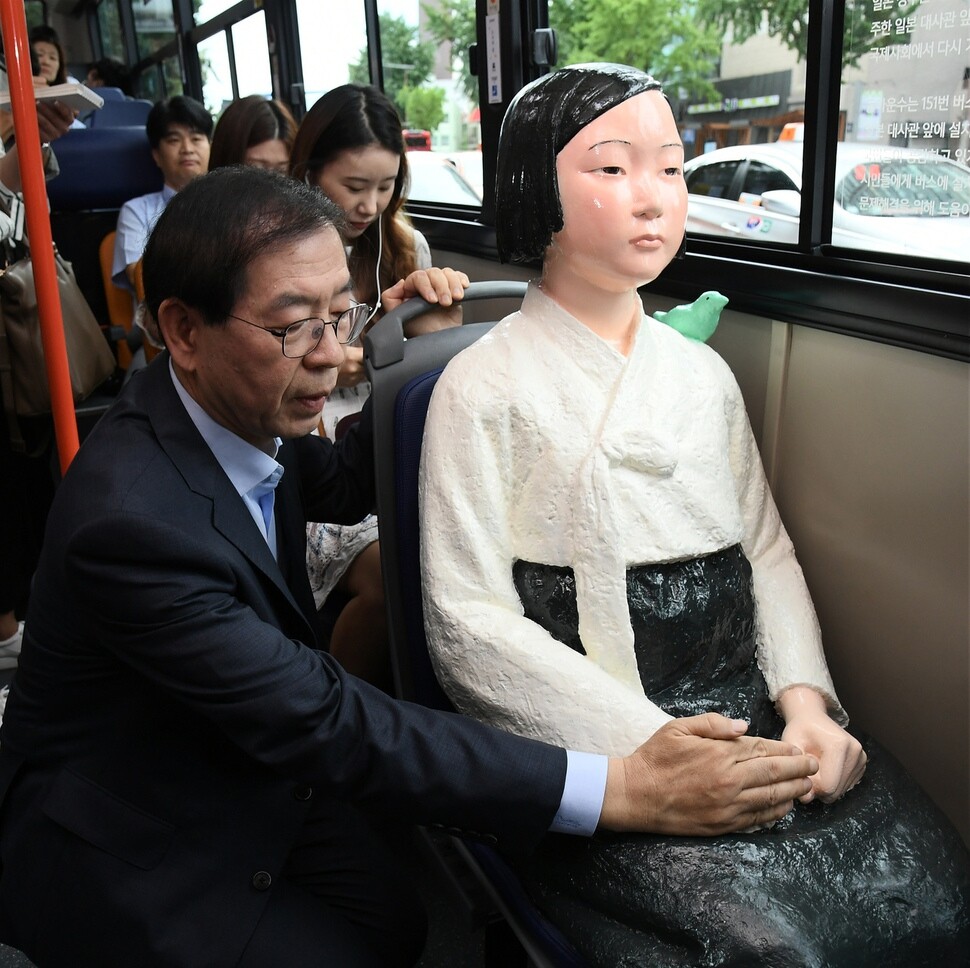hankyoreh
Links to other country sites 다른 나라 사이트 링크
Seoul Mayor takes a seat next to history

“Oh, my. Here she is.”
Seoul Mayor Park Won-soon expressed delight at the sight of a comfort woman statue riding in the second seat on the left on Seoul Bus No. 151, where he sat alongside commuters at 7:55 am on Aug. 14. It was the first day the bus was traveling past the Japanese embassy with the statue as a “passenger” - part of an attempt by bus company Donga Traffic Service to stoke public interest in the Japanese military comfort women issue.
Park’s connection to the comfort women survivors goes back far enough that it is natural for him to ride the bus on the morning of its first day in service with the statue on board. As an attorney in 1993, he lectured on the topic at the University of California, Berkeley; in Dec. 2000, he was the leading prosecutor for the South Korean side at the Women's International War Crimes Tribunal on Japan's Military Sexual Slavery. For the 70th anniversary of Korea’s Liberation last year, he established a “place of remembrance” for the survivors and their painful history on the site of the former Japanese Resident-General’s residence in Namsan Park, where the Korea-Japan Annexation Treaty was signed [in 1910].
Since enacting an ordinance in 2013 to support survivors who were drafted as military comfort women during the Japanese occupation, the city of Seoul has undertaken projects to assist the survivors with daily living as well as manage records related to them. The city’s projects remained even after the Ministry of Gender Equality and Family moved last year to cut the entire budget for comfort women survivors. In July of this year, the first video footage of Korean comfort women was unearthed.
Park rode with the statue on a 10-minute trip from Anguk Subway Station to Euljiro 1-ga Station on Aug. 14, which is designated as the International Memorial Day for the Comfort Women. “When the Moon Jae-in administration took office, they made it clear that past agreements on the comfort women [issue] cannot be accepted or tolerated emotionally by the South Korean people,” he said. “While there are of course differences with the Japanese government, a new agreement that the South Korean people can accept must be reached, even if it takes a long time.”
Park also noted at a “great peace regime was established around the European Union as sufficient basic agreements and compensatory measures were established regarding human rights and the ravages of war between [war crime perpetrator] Germany and other countries.”
The mayor further voiced his view that “there needs to be a more basic agreement and measures for peace between Japan and its victimized neighbors.
Comfort women statues will be traveling on five No. 151 buses until Sept. 30. Made of synthetic resin, the statues will be traveling in October to take seats beside other statues already set up in Daejeon, Jeonju, Daegu, Mokpo, and Busan.
By Nam Eun-joo, staff writer
Please direct questions or comments to [english@hani.co.kr]

Editorial・opinion
![[Column] Park Geun-hye déjà vu in Yoon Suk-yeol [Column] Park Geun-hye déjà vu in Yoon Suk-yeol](https://flexible.img.hani.co.kr/flexible/normal/500/300/imgdb/original/2024/0424/651713945113788.jpg) [Column] Park Geun-hye déjà vu in Yoon Suk-yeol
[Column] Park Geun-hye déjà vu in Yoon Suk-yeol![[Editorial] New weight of N. Korea’s nuclear threats makes dialogue all the more urgent [Editorial] New weight of N. Korea’s nuclear threats makes dialogue all the more urgent](https://flexible.img.hani.co.kr/flexible/normal/500/300/imgdb/original/2024/0424/7317139454662664.jpg) [Editorial] New weight of N. Korea’s nuclear threats makes dialogue all the more urgent
[Editorial] New weight of N. Korea’s nuclear threats makes dialogue all the more urgent- [Guest essay] The real reason Korea’s new right wants to dub Rhee a founding father
- [Column] ‘Choson’: Is it time we start referring to N. Korea in its own terms?
- [Editorial] Japan’s rewriting of history with Korea has gone too far
- [Column] The president’s questionable capacity for dialogue
- [Column] Are chaebol firms just pizza pies for families to divvy up as they please?
- [Column] Has Korea, too, crossed the Rubicon on China?
- [Correspondent’s column] In Japan’s alliance with US, echoes of its past alliances with UK
- [Editorial] Does Yoon think the Korean public is wrong?
Most viewed articles
- 1‘We must say no’: Seoul defense chief on Korean, USFK involvement in hypothetical Taiwan crisis
- 2Will NewJeans end up collateral damage in internal feud at K-pop juggernaut Hybe?
- 3[Column] Park Geun-hye déjà vu in Yoon Suk-yeol
- 4Why Korea shouldn’t welcome Japan’s newly beefed up defense cooperation with US
- 5Thursday to mark start of resignations by senior doctors amid standoff with government
- 6N. Korean hackers breached 10 defense contractors in South for months, police say
- 7[Guest essay] The real reason Korea’s new right wants to dub Rhee a founding father
- 8[Column] ‘Choson’: Is it time we start referring to N. Korea in its own terms?
- 9Kim Jong-un expressed ‘satisfaction’ with nuclear counterstrike drill directed at South
- 10[Editorial] New weight of N. Korea’s nuclear threats makes dialogue all the more urgent